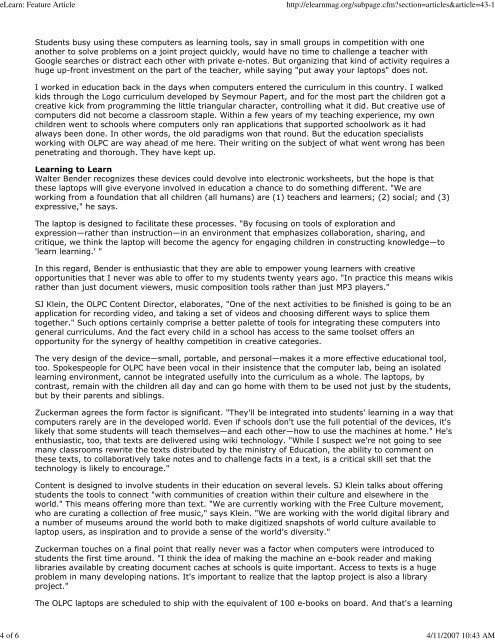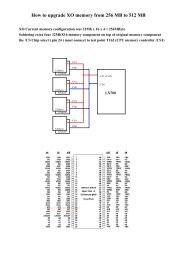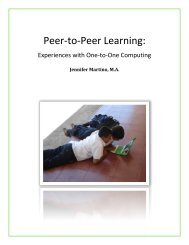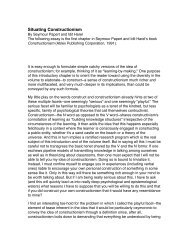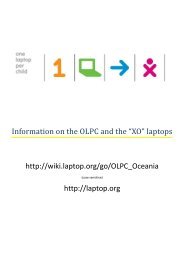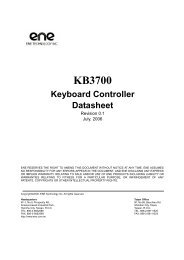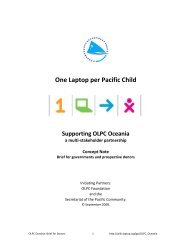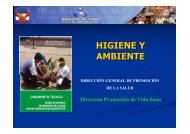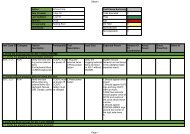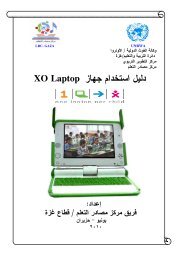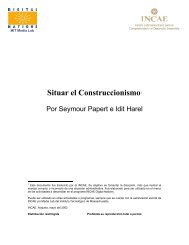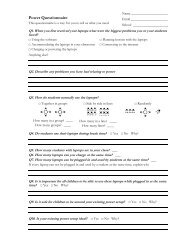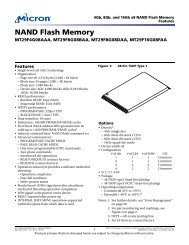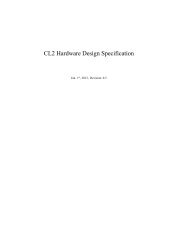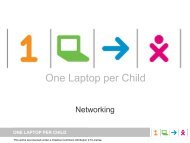eLearn: Feature Article - The OLPC Wiki - One Laptop per Child
eLearn: Feature Article - The OLPC Wiki - One Laptop per Child
eLearn: Feature Article - The OLPC Wiki - One Laptop per Child
You also want an ePaper? Increase the reach of your titles
YUMPU automatically turns print PDFs into web optimized ePapers that Google loves.
<strong>eLearn</strong>: <strong>Feature</strong> <strong>Article</strong>http://elearnmag.org/subpage.cfm?section=articles&article=43-14 of 6 4/11/2007 10:43 AMStudents busy using these computers as learning tools, say in small groups in competition with oneanother to solve problems on a joint project quickly, would have no time to challenge a teacher withGoogle searches or distract each other with private e-notes. But organizing that kind of activity requires ahuge up-front investment on the part of the teacher, while saying "put away your laptops" does not.I worked in education back in the days when computers entered the curriculum in this country. I walkedkids through the Logo curriculum developed by Seymour Pa<strong>per</strong>t, and for the most part the children got acreative kick from programming the little triangular character, controlling what it did. But creative use ofcomputers did not become a classroom staple. Within a few years of my teaching ex<strong>per</strong>ience, my ownchildren went to schools where computers only ran applications that supported schoolwork as it hadalways been done. In other words, the old paradigms won that round. But the education specialistsworking with <strong>OLPC</strong> are way ahead of me here. <strong>The</strong>ir writing on the subject of what went wrong has beenpenetrating and thorough. <strong>The</strong>y have kept up.Learning to LearnWalter Bender recognizes these devices could devolve into electronic worksheets, but the hope is thatthese laptops will give everyone involved in education a chance to do something different. "We areworking from a foundation that all children (all humans) are (1) teachers and learners; (2) social; and (3)expressive," he says.<strong>The</strong> laptop is designed to facilitate these processes. "By focusing on tools of exploration andexpression—rather than instruction—in an environment that emphasizes collaboration, sharing, andcritique, we think the laptop will become the agency for engaging children in constructing knowledge—to'learn learning.' "In this regard, Bender is enthusiastic that they are able to empower young learners with creativeopportunities that I never was able to offer to my students twenty years ago. "In practice this means wikisrather than just document viewers, music composition tools rather than just MP3 players."SJ Klein, the <strong>OLPC</strong> Content Director, elaborates, "<strong>One</strong> of the next activities to be finished is going to be anapplication for recording video, and taking a set of videos and choosing different ways to splice themtogether." Such options certainly comprise a better palette of tools for integrating these computers intogeneral curriculums. And the fact every child in a school has access to the same toolset offers anopportunity for the synergy of healthy competition in creative categories.<strong>The</strong> very design of the device—small, portable, and <strong>per</strong>sonal—makes it a more effective educational tool,too. Spokespeople for <strong>OLPC</strong> have been vocal in their insistence that the computer lab, being an isolatedlearning environment, cannot be integrated usefully into the curriculum as a whole. <strong>The</strong> laptops, bycontrast, remain with the children all day and can go home with them to be used not just by the students,but by their parents and siblings.Zuckerman agrees the form factor is significant. "<strong>The</strong>y'll be integrated into students' learning in a way thatcomputers rarely are in the developed world. Even if schools don't use the full potential of the devices, it'slikely that some students will teach themselves—and each other—how to use the machines at home." He'senthusiastic, too, that texts are delivered using wiki technology. "While I suspect we're not going to seemany classrooms rewrite the texts distributed by the ministry of Education, the ability to comment onthese texts, to collaboratively take notes and to challenge facts in a text, is a critical skill set that thetechnology is likely to encourage."Content is designed to involve students in their education on several levels. SJ Klein talks about offeringstudents the tools to connect "with communities of creation within their culture and elsewhere in theworld." This means offering more than text. "We are currently working with the Free Culture movement,who are curating a collection of free music," says Klein. "We are working with the world digital library anda number of museums around the world both to make digitized snapshots of world culture available tolaptop users, as inspiration and to provide a sense of the world's diversity."Zuckerman touches on a final point that really never was a factor when computers were introduced tostudents the first time around. "I think the idea of making the machine an e-book reader and makinglibraries available by creating document caches at schools is quite important. Access to texts is a hugeproblem in many developing nations. It's important to realize that the laptop project is also a libraryproject."<strong>The</strong> <strong>OLPC</strong> laptops are scheduled to ship with the equivalent of 100 e-books on board. And that's a learning


